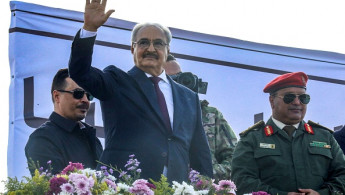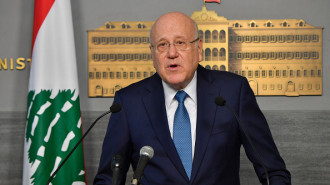Breadcrumb
Libya’s Sharara oil field production halted again amid Spain-Haftar weapons scandal
One of Libya's largest oil fields has reportedly been ordered to fully shut down production by forces connected to Khalifa Haftar after Spain issued an arrest warrant for the warlord's son over allegations of weapons smuggling.
Weeks of protests at the Spanish-operated Sharara Field, 900 kilometers (560 miles) south of Tripoli, led to production cuts from 250,000 barrels of oil per day to around 100,000 barrels.
US financial intelligence firm S&P Global has now confirmed via sources that operations at the plant had entirely ceased, reportedly due to orders of Haftar whose so-called Libyan National Army (LNA) controls much of eastern Libya.
Libya’s UN-recognised government, which opposes Haftar, described the closure of the oil field as "new attempts at political blackmail" and highlighted that Sharara is an important "economic artery" for Libya.
S&P Global said the closure is an attempt by the Libyan rebels to pressure Madrid after Spain’s arrest warrant for Haftar’s son Saddam into the alleged weapons smuggling.
"This move is unlikely to influence the Spanish police, known for their independence even in high-profile cases against the Spanish king himself," a source told S&P Global.
The New Arab cannot independently verify the claims of a shut down.
According to Spanish media, the warrant was based on Spain's confiscation of military equipment and weapons originally bound for the UAE but allegedly destined for eastern Libya, where Haftar's militia operates.
Saddam Haftar, regarded as a central military figure in his father’s armed forces - which is reportedly backed by the UAE and Russia - was reportedly detained at an airport in Naples, where he was questioned for an hour by Italian authorities following the appearance of his name on an EU database.
Sources close to Haftar claim he was merely questioned regarding Spain’s allegations, but said he was never arrested, according to reports.
Haftar's son has not yet commented on the investigation.
Bashir al-Sheikh, the leader of southwestern Libyan protest group The Fezzan Movement, insisted that Saddam Haftar had issued the order to close Sharara Field, despite denying involvement in the decision.
"Saddam Haftar gave immediate instructions by telephone and without the use of military force to shut down the site in response to the attempt to arrest him last Friday in Italy, on the basis of an arrest warrant issued against him in Spain," Bashir al-Sheikh said in a statement.
"I have nothing to do with the closure of the field and I refuse to be accused of this."
Libya's National Oil Corporation (NOC) announced on Tuesday a reduction in oil production at the Al-Sharara oilfield, which accounts for a quarter of the country's output due to the attempted shutdown by protesters.
In an official statement, the NOC declared the "start of a partial reduction in production" at the oilfield and invoked force majeure in response to protests by the Fezzan Movement, which is named after the region where the Sharara field is located.
Special Envoy Ambassador Norland: “NOC Chairman Farhat Bengdara and I met to discuss the current production shutdown at Sharara field. Libya’s oil production is its economic lifeline. Production stoppages hurt all Libyans. The U.S. reaffirms the importance of maintaining the… pic.twitter.com/vtiivlFD1Y
— U.S. Embassy - Libya (@USEmbassyLibya) August 6, 2024
While the statement did not specify the protesters' demands, it urged "concerned parties to consider the national interest" and to support "efforts to stabilize and increase production".
The Fezzan Movement says it advocates for the economic and social rights of the population of southwestern region including demands for greater inclusion in the energy sector job market.
Declaring force majeure allows the NOC to be released from contractual obligations when unforeseen circumstances, such as conflict or natural disasters, prevent the fulfillment of quotas.
The Sharara oil field is operated by a joint venture between the NOC and four European companies.
Despite having Africa's largest oil reserves, Libya has faced repeated interruptions in crude production due to protests and clashes between rival factions.
Since an uprising toppled dictator Muammar Gaddafi in 2011, Libya has been engulfed in armed conflict and political instability.
The country remains divided between an UN-recognized government in the west and an eastern administration supported by Khalifa Haftar.
Oil revenues are crucial to Libya's economy, and the NOC is one of the few institutions that has largely remained intact amid the nation's turmoil.






![Anthony Blinken speech [Getty] Anthony Blinken speech [Getty]](/sites/default/files/styles/image_684x385/public/media/images/6263436E-8ACD-4D3C-9055-25A7BE79DD5A.jpg?h=d1cb525d&itok=fLHmHCRG)
 Follow the Middle East's top stories in English at The New Arab on Google News
Follow the Middle East's top stories in English at The New Arab on Google News


![Paula Yacoubian was verbally attacked by Salim Aoun during a parliamentary session [Getty]](/sites/default/files/styles/image_330x185/public/1150162486.jpeg?h=b9615360&itok=xysBxMUJ)